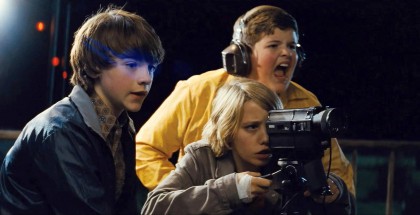VOD film review: C’mon C’mon
Review Overview
Acting
10Honesty
10Emotion
10David Farnor | On 25, Feb 2022
“I’m going to ask you a series of questions and there are no right and wrong answers.” Those are the words of Johnny (Joaquin Phoenix) in C’mon C’mon, a film that follows his radio journalist as he travels across America to quiz a bunch of young people about their hopes and fears for the future. It’s an ambitious, open-ended project, which makes it at once dizzyingly complex and profoundly simple – and that paradox is echoed organically by the film itself.
Johnny’s journey is complicated by an unexpected additional companion: his nephew, Jesse (Woody Norman), whose mum, Viv (Gaby Hoffman), hasn’t spoken to Johnny since the death of the siblings’ mother a year ago. But when Viv’s estranged partner, Paul (Scoot McNairy), has to be taken to a facility to help with his bipolar depression, she turns to Johnny to look after her eight-year-old son. Johnny, who has just split up with his girlfriend, is emotionally fragile but is earnest by default, even when he’s being immature.
Jesse is a jolt of responsibility for Johnny, and part of C’mon C’mon’s emotional core is the childless manchild coming to understand the challenges and difficulties of parenting – while his stewardship of Jesse brings some new learning experiences for the boy, Mills’ focus is tapping into the wisdom that kids can impart to adults with a swooning lyricism. That’s complemented by Johnny and Viv gradually rediscovering their ability to connect with each other – a mutual opening up that turns a fairly familiar starting point into an achingly heartfelt study of vulnerability.
Joaquin Phoenix is sublime as the kind and intelligent introvert, matched by Hoffman’s remarkable yet generous turn as his frustrated sister pushed beyond her already patient breaking point. But both are surpassed by Woody Norman’s wonderfully charming presence, which manages to be as precocious as it is endearingly natural.
The film is at its best when just soaking up the chemistry between Phoenix and Norman, their intimate conversations in monochrome close-ups smartly cut together with the actual interviews with teenagers talking about their lives, their families, their hopes and dreams. The fact that both ring with the same authenticity is testament to how richly textured Mills’ filmmaking is, able to find empathy and humanity in silence as well as speech.
The result is a gorgeously open-ended piece of cinema, one that celebrates the power of just listening to others and remembering what they say. As Jesse, a reluctant interviewer, becomes immersed in the noise of the world surrounding him, Mike Mills whisks us into a reverie of sound and feelings – the exhilarating rush of wind, the moving breeze of a sigh and the fuzzy exhale of catharsis. It’s profoundly simple and simply profound.



















